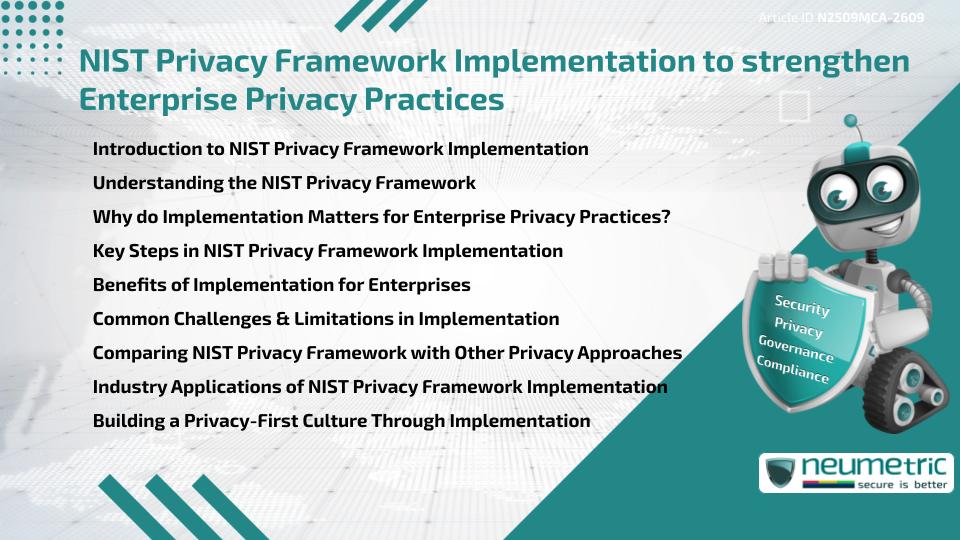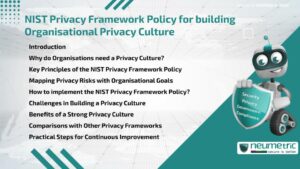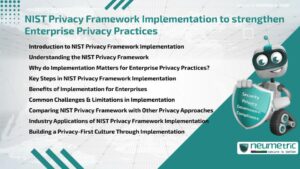Table of Contents
ToggleIntroduction to NIST Privacy Framework Implementation
The NIST Privacy Framework Implementation to strengthen Enterprise Privacy Practices provides Organisations with a structured way to protect Personal Data & manage Privacy Risks. By embedding the National Institute of Standards & Technology [NIST] Privacy Framework into day-to-day operations, enterprises can enhance Accountability, reduce Vulnerabilities & align with Regulatory obligations. Implementation is not a one-time project but a continuous process that integrates Privacy into Governance, Technology & Culture.
Understanding the NIST Privacy Framework
The NIST Privacy Framework is a voluntary tool designed to help Organisations manage Privacy Risks in a structured manner. Built on the model of the NIST Cybersecurity Framework, it consists of three main components: Core, Profiles & Implementation Tiers.
- Core: A set of activities such as identifying Risks, governing Privacy, Controlling data use & responding to Incidents.
- Profiles: Tailored approaches that align the Framework with business priorities & Privacy goals.
- Implementation Tiers: Indicators of how advanced or mature an organisation’s Privacy practices are.
Together, these components create a flexible roadmap that Organisations can adapt to their unique contexts.
Why do Implementation Matters for Enterprise Privacy Practices?
Implementation transforms the NIST Privacy Framework from a theoretical model into practical safeguards. Enterprises handle large volumes of Personal Data, making them prime targets for Privacy Breaches. A NIST Privacy Framework implementation ensures that Policies translate into real-world protections. Much like a safety manual becomes effective only when followed, the Framework delivers value only when actively implemented. Enterprises gain not just Compliance benefits but also enhanced Trust among Customers, Partners & Regulators.
Key Steps in NIST Privacy Framework Implementation
Enterprises can follow a series of structured steps to achieve effective NIST Privacy Framework implementation:
- Assess Current State: Review existing Privacy Policies, Risks & Practices.
- Define Target Profile: Establish the desired state of Privacy practices tailored to business needs.
- Gap Analysis: Identify differences between the current & target profiles.
- Develop Action Plan: Create a roadmap with timelines, responsibilities & resources.
- Execute Controls: Implement measures such as Encryption, Access Restrictions & Staff training.
- Monitor Progress: Track changes & ensure alignment with the Implementation Tiers.
- Review & Improve: Continuously adapt to new Threats, Technologies & Regulatory updates.
These steps provide a cycle of Continuous Improvement & Resilience.
Benefits of Implementation for Enterprises
Enterprises that embrace NIST Privacy Framework implementation experience several benefits:
- Regulatory Alignment: Supports Compliance with laws such as the General Data Protection Regulation [GDPR] & the California Consumer Privacy Act [CCPA].
- Risk Reduction: Identifies & mitigates Privacy Threats before they escalate.
- Operational Efficiency: Streamlines Privacy Governance & integrates it into enterprise processes.
- Enhanced Trust: Demonstrates Accountability to Customers & Business Partners.
- Flexibility: Adapts to diverse industries & organisational sizes.
Common Challenges & Limitations in Implementation
While beneficial, implementation faces challenges. Enterprises often struggle with limited resources or lack of skilled staff. Resistance to change may slow adoption, especially if Employees view Privacy practices as burdensome. Rapidly evolving technologies create moving targets, making it difficult to maintain updated Controls. Furthermore, enterprises may underestimate the cultural shift required, treating implementation as an IT project rather than an organisational transformation. Overcoming these challenges requires leadership support, training & clear communication.
Comparing NIST Privacy Framework with Other Privacy Approaches
The NIST Privacy Framework is not the only tool available. The GDPR & CCPA provide legal obligations, while ISO/IEC 27701 outlines requirements for a Privacy Information Management System. Unlike these mandatory standards, the NIST Privacy Framework is voluntary but complements them by offering flexibility & scalability. It bridges the gap between high-level Compliance & practical Privacy management, making it an ideal companion to Regulatory & Industry-specific frameworks.
Industry Applications of NIST Privacy Framework Implementation
NIST Privacy Framework implementation has practical applications across industries.
- Healthcare: Supports Compliance with HIPAA by managing Patient Data responsibly.
- Financial Services: Protects Sensitive account & transaction information.
- Technology: Ensures that Mobile apps, Cloud platforms & Artificial Intelligence systems respect User Privacy.
- Retail: Safeguards Customer Data collected through E-commerce platforms & loyalty programs.
Its adaptability allows Organisations in different sectors to strengthen Privacy in ways that reflect their specific Risks.
Building a Privacy-First Culture Through Implementation
Beyond Policies & Controls, implementation fosters a culture where Privacy is valued as a Core Principle. Employees begin to see Privacy not as a checklist but as a responsibility embedded in everyday operations. Regular training, transparent Communication & Accountability reinforce this culture. A strong Privacy-first mindset ensures that enterprises maintain Resilience, Trust & Compliance even in rapidly changing environments.
Conclusion
The NIST Privacy Framework Implementation to strengthen Enterprise Privacy Practices is a powerful tool that helps Organisations turn Privacy goals into action. By embedding the Framework into Governance, Technology & Culture, enterprises achieve Resilience, Compliance & Trust. Implementation ensures that Privacy is not just a policy but a practice sustained over time.
Takeaways
- A NIST Privacy Framework implementation transforms principles into practical safeguards.
- Implementation improves Compliance, Risk Management & Trust.
- Enterprises benefit from a flexible & scalable approach.
- Cultural change is as important as technical measures in implementation.
FAQ
What is a NIST Privacy Framework implementation?
It is the process of integrating the NIST Privacy Framework into enterprise operations to strengthen Privacy practices.
Why should enterprises implement the NIST Privacy Framework?
Implementation reduces Risks, improves Compliance & builds Trust with Customers & Partners.
What are the steps of implementation?
Key steps include assessing current practices, defining a target profile, performing Gap Analysis, executing Controls & Continuous Monitoring.
How does implementation support Compliance?
It aligns with global regulations such as GDPR & CCPA while offering flexibility to adapt to organisational needs.
What challenges occur in implementation?
Challenges include resource constraints, Employee resistance, evolving technologies & underestimating cultural change.
Is the NIST Privacy Framework mandatory?
No, it is voluntary but complements mandatory Regulations & Industry Standards.
Can Small Businesses implement the NIST Privacy Framework?
Yes, the Framework is designed to be scalable & adaptable to Organisations of all sizes.
Need help for Security, Privacy, Governance & VAPT?
Neumetric provides organisations the necessary help to achieve their Cybersecurity, Compliance, Governance, Privacy, Certifications & Pentesting needs.
Organisations & Businesses, specifically those which provide SaaS & AI Solutions in the Fintech, BFSI & other regulated sectors, usually need a Cybersecurity Partner for meeting & maintaining the ongoing Security & Privacy needs & requirements of their Enterprise Clients & Privacy conscious Customers.
SOC 2, ISO 27001, ISO 42001, NIST, HIPAA, HECVAT, EU GDPR are some of the Frameworks that are served by Fusion – a SaaS, multimodular, multitenant, centralised, automated, Cybersecurity & Compliance Management system.
Neumetric also provides Expert Services for technical security which covers VAPT for Web Applications, APIs, iOS & Android Mobile Apps, Security Testing for AWS & other Cloud Environments & Cloud Infrastructure & other similar scopes.
Reach out to us by Email or filling out the Contact Form…





